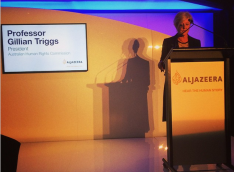Terror laws a ‘backward step for democracy’
 The president of the Human Rights Commission has lashed the federal government over the impact of new terror laws on journalists, arguing they are a “serious backward step for democracy.”
The president of the Human Rights Commission has lashed the federal government over the impact of new terror laws on journalists, arguing they are a “serious backward step for democracy.”
Speaking at an Al Jazeera event in Sydney in support of Australian journalist Peter Greste who has been jailed by Egyptian authorities, Professor Gillian Triggs told the audience that press freedom was a major issue both overseas and at home.
“As things stand at the moment, journalists risk very serious penalties for reporting and investigating ASIO operations and in my view that is serious backward step for democracy,” said Triggs, noting how the recently passed laws give more powers to security agencies, and allow journalists to be jailed for up to ten years if they report on ASIO operations which have been classed as “special intelligence operations”.
“This is something that all Australians need to be aware of,” she said. “You’ll be aware that the new legislation which has been passed attacks those journalist who might protect whistleblowers, which is a travesty of justice.”
Triggs focused on Section 35P of the laws which imposes a jail term of up to 10 years for anyone, including journalists, who make an “unauthorised disclosure of information”, a law which the union says criminalises the work of journalists if they receive information about a special intelligence operation, particularly from whistleblowers or “trusted insiders” .
“The ASIO act now creates an offence, this is the notorious Section 35P, that if a person discloses information which relates to a special intelligence operation that might involve ASIO employees and affiliates,” she said.
“Clearly the new law has the potential to limit the right to freedom of speech and the International Human Rights Council has confirmed that journalists should not be punished for carrying out their legitimate duties.”
A number of key groups have come out against the laws, including most of the major media companies and the Media Entertainment and Arts Alliance.
Triggs argued that the laws had been passed with little public consultation and that at a minimum they needed to be revised.
“(The laws) have been introduced in a context where there is no ability for the public to engage,” she said. “At the very least we recommend, that if he or she must be prosecuted, that it must be likely that the disclosure will endanger a person or prejudice the operation.”
“This of course comes at a time when the community increasingly demands transparency for activities carried out in their name, but we are seeing a greater degree of overreach creeping in to the area of executive discretion.”
Nic Christensen




It is hard not to assume the new terror laws relating to journalists have been put in place because the government now considers journalists to be terrorists. If that is not the case when what is the government trying to hide?
User ID not verified.